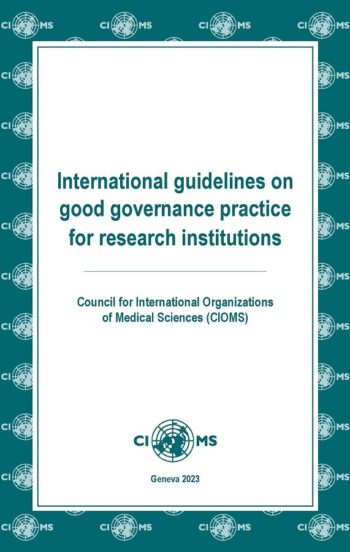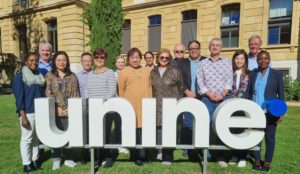
———————————–
Click here for the member area of WG Good Governance for Research Institutions
Good Governance Practice for Research Institutions

Participants at the eighth meeting of the Working Group held in the Institute of Health Law of the University of Neuchâtel (Switzerland) 31st August – 1st September 2023.
Background
Over the last 50 years, the Declaration of Helsinki has been revised 6 times (8 if one counts the notes of clarification on the placebo rule from 2002 and 2004). The CIOMS International ethical guidelines for health-related research involving humans have also been reshaped three times, not mentioning their merging with the 2009 Guidelines for epidemiological studies, which had been revised once since the original version in 1991. During the same period, many guiding documents, regulations and laws have been adopted at the national, regional and international levels.
Fifty years later, it is questionable whether researchers are better equipped to face the challenges raised by their activities. They often lack the necessary resources to respond to the increasingly complex ethical and regulatory framework of research. Most regulations focus on the responsibilities of researchers and the sponsors, but provide little or even no details on means to achieve them. In particular, there is limited guidance on the governance of research institutions even if it is central to defining the context in which research involving human participants is conducted. Instead of adding more rules or revising existing ones, it seems a priority today to improve the research environment.
The issues
Most ethical guidelines and laws focus on individual researchers and sponsors to protect the dignity, integrity and safety of research participants – Research Ethics Committees (REC) acting as gatekeepers. Yet, it is rarely assessed to what extent researchers and sponsors have the necessary resources to fulfil their responsibilities. More precisely, this assessment is done separately for each protocol. It does not provide a broad picture of the research activities and available resources in a given company, hospital or university to guarantee the protection of research participants in the end.
Resources means here time, training, qualified staff, facilities, clinical and laboratories equipment, hardware and software, communication tools, data protection infrastructure, health databases and biobanks, ethical and legal counselling, etc. This is not only a matter of financial support but more a question of governance. In other words, what services and supports are available for the researchers to meet their responsibilities as imposed by research ethics and regulation? Adding more rules does not guarantee that the researchers are able to fulfil them unless they are provided with the necessary means to do it.
In 2016, the World Medical Association included a section on governance in the Declaration of Taipei on Ethical Considerations regarding Health Databases and Biobanks. This demonstrates the need for a different approach to research ethics that addresses the responsibilities of the institutions in which researchers are working. COVID-19 has shown a necessity at the world level of more coordination and collaboration within the research community, both objectives that can hardly be achieved by researchers individually. This requires an institutional commitment at all levels.
Working Group objectives
A new CIOMS Working Group would propose standard guidelines promoting the minimal resources needed for researchers to work in accordance with the highest standards in research ethics and regulation.
Progress
- 1st meeting held on 7 July 2021 (virtual) Minutes
- 2nd meeting held on 6 October 2021 (virtual) Minutes
- 3rd meeting held on 11 February 2022 (virtual) Minutes
- 4th meeting held on 22 August 2022 (virtual) Minutes
- 5th meeting held 10-12 November 2022 (Geneva, Switzerland) Minutes
- 6th meeting held on 6 February 2023 (virtual) Minutes
- 7th meeting held on 27 March 2023 (virtual) Minutes
- 8th meeting held 31 August-1 September (Neuchâtel) Minutes
CIOMS Working Groups usually take 2-4 years to finalize their consensus document and recommendations. Most groups hold two in-person meetings per year, with telework in between. The groups make use of collaborative efforts and capitalize on existing initiatives in order to provide output that is as comprehensive as possible, does not duplicate other efforts and has added value.
CIOMS MEETINGS
Upcoming Meetings
29 - 30 June 2026
Geneva, Switzerland
3rd Meeting Working Group XVII on Long-term safety for medicinal products
23 February 2026
Virtual
